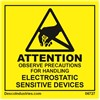
CWT Compact S2 Installation & Maintenance Manual
What is ESD?
 ESD is an abbreviation for Electro Static Discharge.
ESD is an abbreviation for Electro Static Discharge.
Electrical charges are build up when materials are rubbed or separated – e.g. when you walk across a carpet or get out of your car. The charge, which may be several thousand volts, can then be transferred to other objects if they get close enough.
| Caution: Handling ordinary plastic causes a charge to build up. |
Most modern integrated circuits are extremely sensitive to ESD. The component either ceases functioning altogether, causing the equipment to stop working, or suffers damage that makes it extremely susceptible to further injury. This can eventually result in intermittent faults that are extremely difficult to locate.
| Caution: Never expose ESD-sensitive components to shocks of static electricity. |
Avoiding ESD damage
Rule number 1: Prevent charge build-up!
Plastic packaging and other large plastic objects can transfer charges to conductive objects, which can then damage components. Except for special anti-static plastic, all plastic must be kept away from unconnected printed circuit board assemblies.
Rule number 2: If you need to work with electronic components or modules, connect yourself through a wristband to a grounded part inside the terminal.
Avoid touching connector pins/poles and components on printed circuit board assemblies.
Ensure that all components containing electronic parts are always stored in an ESD protection bag when handled outside the terminal.
Remember that the bags’ insulating properties gradually wears out. Always use a new bag.
The following ESD protection accessories can be ordered from Flowbird.
0401-E0360 |
Wristband (for connection to the ticket terminal cabinet) |
0040-07012 |
ESD bag, small (fits print head and coin verifier, etc.) |
0040-07013 |
ESD bag, large (fits CPU board etc.) |
